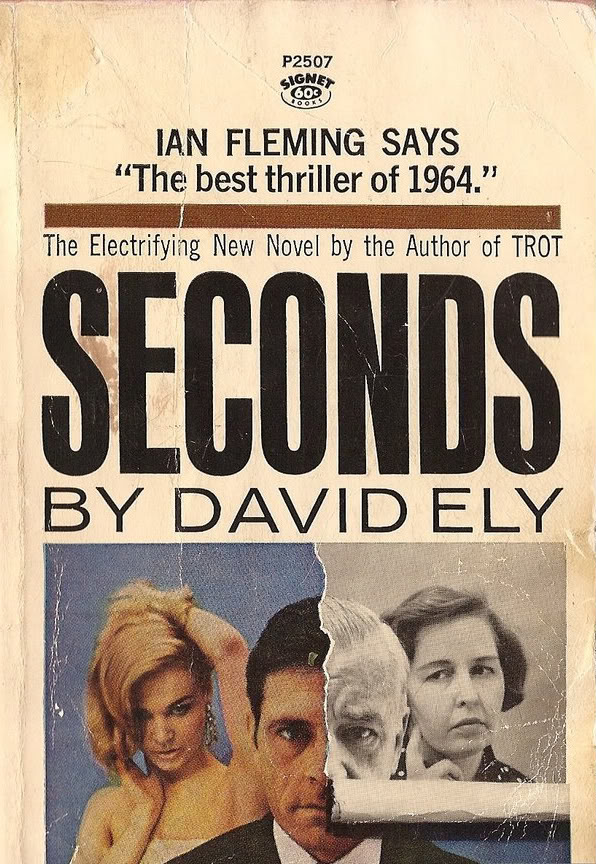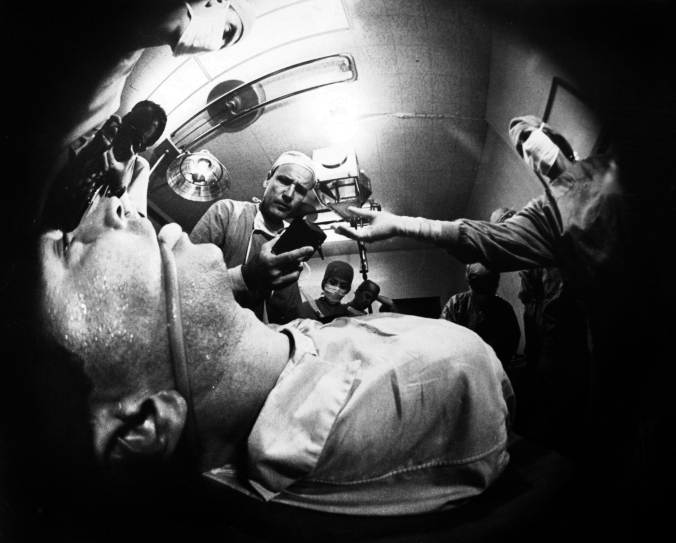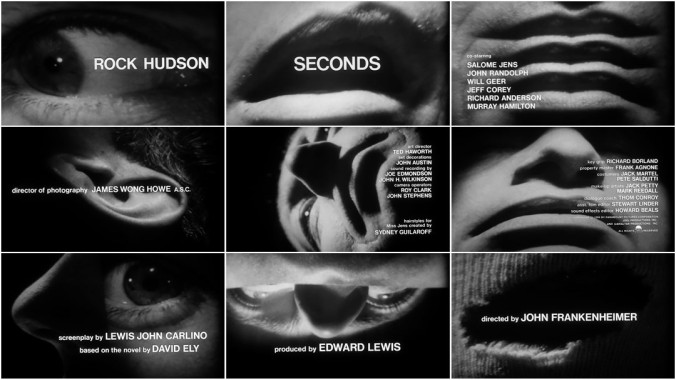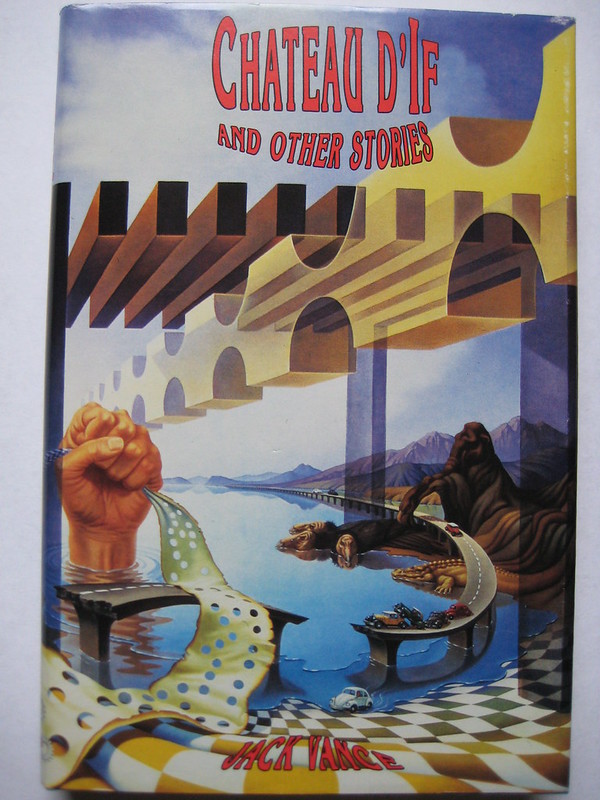(Uncredited cover for the 1963 1st edition)
5/5 (Masterpiece)
You’ve got what almost every middle-aged man in American would like to have. Freedom. Real freedom. You can do any damned thing you want to. You’ve got financial security, you’ve got no responsibilities, and you’ve got no reason at all to feel guilty about what you’ve done. The company’s taken care of everything. Right?” (91)
David Ely’s Seconds (1962), a disquieting and sparse thriller, posits a near future where a shadow organization can grant the wealthy new identities via plastic surgery and staged deaths. Wielding deceptively simple prose, Ely ruminates on the existential dread of the male mid-life crisis–an undefined desire to escape, to redo, to break free from the expectations and constraints of the suburban existence. It is a careful novel. A well-crafted nightmare, a bludgeon to the solar plexus….
Brief Plot Summary
Wilson, a successful professional and husband with a future ahead of him as “a president of [a] bank, which is a sizable one” (20) receives a call from a friend he had presumed dead. Charlie, who according to witness jumped into a volcano, reminisces at length with Wilson about their college days before describing the “rebirth” he experienced (22): “To put it another way, you were ready for such a call” (25). Wilson soon receives a scrap of paper with an address. And he makes the tentative first steps…
Wilson, although he might desire a new beginning cannot fully commit, is soon entrapped by increasingly nefarious means. Within the company itself—with a purgatory-like waiting room where men “were engaged in little hobbies, such as gluing together ship models, while others sat at their ease in comfortable chairs” (30)–Wilson increasingly becomes detached from reality. Surreal sequences unfold where he is asked about the type of death he prefers (and is willing to pay for) and undergoes psychological tests to identify the career he really wanted (painter), etc. Wilson, used to the careful and expected pre-programmed movements he made throughout his life, becomes increasingly anxious as the company uses more and more aggressive ways to compel him towards “rebirth.”
Rebirth grants Wilson a new physique, a new career, a new life, and a new name, Antiochus (Tony) Wilson: “the surgeons had done an extraordinary job. They had taken a face that tended to be rounded, florid, a bit jowly, and somehow made it lean and long and hard” (65). Armed with a forged diploma in fine arts and “letters from the masters [he] worked under, plus notices of [his] first six one-man shows,” Wilson enters his new community expectant (61). However, his excitement turns towards dread as a man whom he does not recognize shouts his new name on the street (68).
Terrified that he possesses the look of another man rather than that of a completely new individual, the company has Charlie call to reassure him. Charlie reveals the nature Wilson’s new community: a community of rebuilt people instructed to “greet you as an old friend” (93). Men and women who are all aware that they are not whom they say they are…. but who will not outright state it. Wilson, “suddenly struck by the amusing notion that he was present at a masquerade whose social façade, ostensibly so proper and ordinary, would at any moment be thrown into confusion with the ripping off of masks and the beginning of wild dancing” (100), abruptly flees. Wild notions fill his head. What did his family think of his death? Did he lead a life without authentic connections to those he claimed to love? Will he ever be able to fully absorb his new persona? Or is it yet another mask he must tear off?
Final Thoughts
Seconds is characterized by a rigorous narrative economy populated by a handful of characters whose every interaction will return later as an important plot or thematic anchor. For Wilson, the 1950s suburban ideal–a career, the physical trappings of success, a wife, children–creates intense mental displacement. Wilson’s dreams and desires of youth are hammered into molds society imposes. But in reality, Wilson never pursued his own passions in any serious manner. Rebirth will yield a new array of identity crises.
The novel achieves Wilson’s growing psychological discomfort through a series of strategic distancing metaphors (masks, aquariums filled with ants, and waiting rooms) and harrowing yet quiet scenes (the phone calls with Charlie, visits to his family, and moments where characters see through his mask). Moments of offhanded horror add to the nighmarish qualities of the work. For example, Wilson learns, recently awake after his surgery, that the bodies used to extract new teeth and fingerprints come from Latin America and “most of ‘em are on the short side, and then the skin tends to be darkish” (55). In another instance at a party with his fellow rebuilt humans, a woman whom he recognizes from his previous life comments that she “change[s] sects” regularly (99). Without a firm identity to anchor oneself, the reconstructed enter a decadent and aimless liminal zone. A zone little different than the one he had fled!
I place Seconds, due to Ely’s precise control of his narrative and general discomfort generated by the introspective yet riveting premise, firmly among my favorite SF novels of the 1960s (for a list). For whatever reason, Ely’s novel is more often than not ignored as a work of SF–and seldom appears in best of lists. I went ahead and acquired his only other SF novel — A Journal of the Flood Year (1992) (plot blurb + discussion here).
Highly recommended. A must read for fans of near future thrillers and 60s SF.
A brief note about the 1966 film adaptation: John Frankenheimer’s spectacular adaptation, with harrowing cinematography by James Wong Howe, is not to be missed. His adaptation changes only small elements of the original novel but conveys the intense paranoia, existential terror, and is, in itself, an example of experimental style fitting and adding to the material. I’ve included a few stills from the film below.
Read the book. Watch the film. In any order.
(Uncredited cover for a 1960s edition)
(Uncredited cover for the 1963 edition)
(German poster for the 1964 film)
(Criterion film poster)
(Still from the 1964 film)
(Sections of the film’s title sequence)
For more book reviews consult the INDEX







I saw the film sometime in the 60s, on TV. Was a teenager then-really must try to see it again. In memory, excellent and unique.
Both are absolutely wonderful….
Tempted to read the novel? I get the feeling that almost all fans of the movie (if they enjoy reading) will enjoy the book. I seldom have encountered such a faithful adaptation in plot and tone (I tend to care little if it’s faithful or not but it’s shocking when I encounter one!).
Sounds pretty cool! Great review!
Thanks for visiting!
What elements particularly intrigue you?
The part about having your face remade I think. It vaguely reminds me of Minority Report where they have their eyes replaced to get a new identity. I haven’t actually read that story (by Phillip K Dick) but I always loved the movie, and have been meaning to read the story for sometime now.
Which I know has little to do with this book, but is why it intrigued me. Lol
Yeah, the underlying idea of refashioning oneself is a seductive premise.
Huge fan of the Minority Report film — a relatively intelligent action thriller than has some meat behind all the action and CGI….
I agree! I think it kind of bombed with critics but I also thought it was great. Have you read the book?
It didn’t bomb with critics — it has a 91% on rottentomatoes.
https://www.rottentomatoes.com/m/minority_report
The short story? Absolutely. I’ve read almost a hundred of his short stories and 15+ of his novels. Huge fan.
Huh- I guess I’m remembering wrong! I’ve only read The Man in the High Castle And wasn’t sure I understood it. Maybe I’ll try his short stories. I feel like those are sometimes a good introduction to an author.
Perhaps you remember reading one particular critic — as a teen I remember reading Ebert’s review when it came out, and it was quite positive (4/4). https://www.rogerebert.com/reviews/minority-report-2002
I’m not sure there is a good place to start with PKD — it will always feel like plunging into the deep end. There are a few places NOT to start (i.e. Valis etc.)
In terms of novels I really enjoyed Martian Time-Slip (1964), Clans of the Alphane Moon (1964), The Penultimate Truth (1964), The Three Stigmata of Palmer Eldritch (1965), Ubik (1969), A Maze of Death (1970), and Do Androids Dream of Electric Sheep? (1968) — among others (Man in the High Castle was also wonderful).
Did not care for Radio Free Albemuth (1986), The Man Who Japed (1956), Counter-Clock World (1967), The Zap Gun (1967), Dr. Futurity (1960), or The World Jones Made (1956)…
I’ve read more of his but those come to mind.
I have seen the movie but not as of yet read the novel. The movie is absolutely great. I have seen the moive at least once or twice, I have a feeling the novel is better.
Thanks for visiting.
They are both spectacular. While Frankenheimer attempts to be a tad more “avant-garde,” both work to a tee… I found the experimental elements of the movie are used to great effect (for example, the early dream scene is identical both in the book and in the movie).
I highly recommend you track down a copy of the novel!
Based on your 5/5 rating, I took a quick look at one of my suppliers’ sites and discovered that (at least in theory) thre was an edition available to order. So I did! ow to wait and see if they meant it!
The plot also put me in mind somewhat of Jack Vance’s novella Chateau d’If, whose rather more obvious alternate title imposed on it for magazine publication was New Bodies for Old.


I say a few things about it here
and the opening paragraphs of it in the 1950 pulp it first appeared in. with Virgil Finlay art, are here:
It was a riveting read (I hope you enjoy it) — have you seen the film?
I’ve never seen that cover — intrigued!
No, I haven’t seen the film and, almost more surprisingly, M dosn’t know it either! It’s on our list to watch oout for now, though!
The cover of the Vance book is by Ilene Mayer, whose art is well worth checking out. Underwood Books (one half of Vance specialists Underwood Miller) published a very nice book of her art some years ago. I first noticed her when U/M published their 5-volume set of Philip K. Dick short stories back in the late 1980s or so. Great, surreal stuff!
As for PKD recommendations, I agree largely with your likes and dislikes; personal favourites are Martian Time-Slip and Ubiq. Did quite like Radio Free Albemuth – it was kind of Valis-lite wasn’t it?
Let me know what you think of the movie.
Meyer’s 1991 Valis cover might be my favorite.
Saw that film – on someone’s recommendation. Excellent. I’ll keep my eyes open for the book.
What did you think of it? The book is as good as the film….
I recall liked the film quite a bit.
*Terrible typo there 😦
I recall liking the film quite a bit.
My biggest problem with the book is actually pretty minor: I don’t understand how someone in his position had enough money to provide the life/etc. they give him. I understand that some of it came from insurance, but it reads like far, far more than I would expect to have given his position. Maybe I don’t understand how much bankers make even at levels that don’t involve high-level management.
Now for the positives: I think the style is quite good. I was absorbed into the story from the beginning by the charming way our protagonist approaches the world. It read a bit like a Stapledon novel in the matter-of-fact gentlemanly speech. I was a huge fan of that.
I thought the plot was tightly wound and never really lagged. I don’t think any of the supporting characters were very strong, but Wilson is a strong enough character that that didn’t matter. I also thought the ending gave it a twist that I enjoyed.
Ah, I didn’t really think about the price. I would suspect a top-level executive of a mid-sized bank would be rolling in dough though….
But yes, I too enjoyed the style and the hyper-focus on Wilson. I think the lack of supporting characters makes sense. He has no one to latch onto, he creates no meaning in the people and world around him, he is the focus — his own internal crisis is the focus.
The movie, which is also brilliant, stretches the middle portion in an attempt to create more secondary characters (the movie doesn’t invent characters but increases their screen time/role).
Glad you enjoyed it!